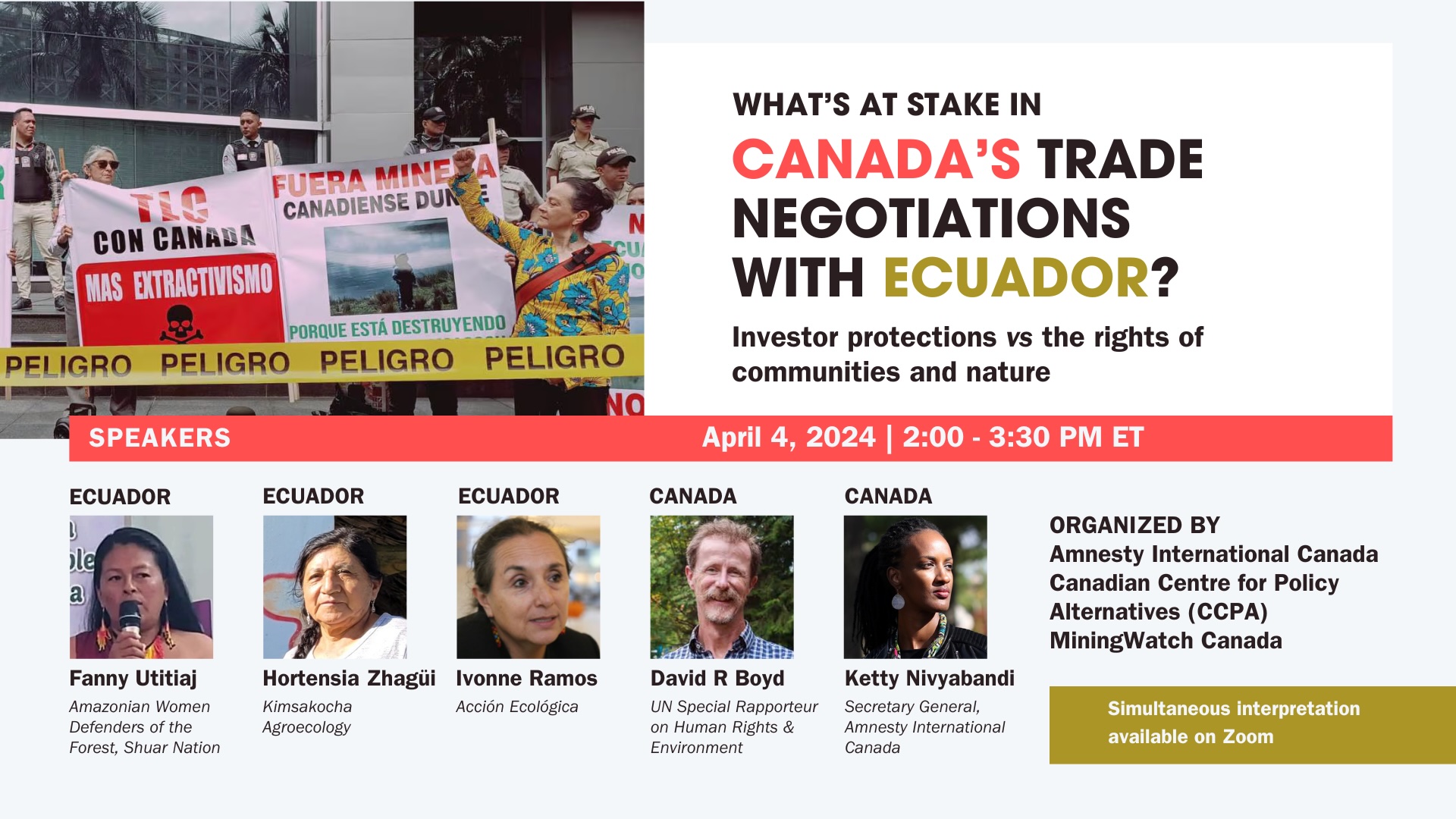April 4, 2024 at 2PM ET | Register here | Facebook
This is a bilingual event in Spanish and English. Simultaneous interpretation will be provided.
Canada and Ecuador have jumped headfirst into Free Trade Agreement negotiations they hope to finish by 2025 — but key voices are being left out. What’s already clear is that the agreement is being designed to attract and protect Canadian mining investment in Ecuador.
What’s at stake? Hear directly from Ecuadorian organizations and communities impacted by Canadian oil and mining projects about a lack of transparency, inclusiveness, and consultation about these projects and the trade negotiations themselves. Get a glimpse of what more Canadian mining and oil investment could mean for these communities and all Ecuadorians if a FTA is passed. Learn about how a planned ISDS in the deal would prioritize the rights of transnational companies over communities and the environment. Hear from David R. Boyd, the United Nations’ Special Rapporteur on human rights and the environment, whose latest report warned about “the catastrophic consequences of investor-state dispute settlement process (ISDS) for climate and environment action and human rights.”
Join us to hear from some of these crucial voices that are being left out of FTA negotiations — and what you can do about it!
Opening remarks by Ketty Nivyabandi, Secretary General, Amnesty International Canada.
With participation from:
- Fanny Utitiaj, Amazonian Women Defenders of the Forest, Shuar Nation
- Hortensia Zhagüi, Kimsakocha Women’s School of Agroecology and Board of Potable Water Administrators of Victoria del Portete and Tarqui
- Ivonne Ramos, Acción Ecológica
With comments by: David R. Boyd, UN Special Rapporteur on Human Rights and the Environment, who will discuss the human rights and environmental implications of investor-state dispute settlement process (ISDS), based on the findings of his recent thematic report, Paying Polluters (2023).
ORGANIZED BY: Amnesty International Canada, Canadian Centre for Policy Alternatives, and MiningWatch Canada.
More about the panelists:
Amazonian Women Defenders of the Forest is a collective formed by women belonging to the seven nationalities of the Ecuadorian Amazon: Kichwa, Shuar, Achuar, Waorani, Shiwiar, Andoas and Sápara. Dedicated to defending ancestral territory, nature, the health of their communities and women’s rights, members of the collective have been threatened and attacked for seeking to stop destructive oil and mining operations.
Board of Potable Water Administrators of Victoria del Portete and Tarqui is formed by Indigenous and campesino communities who have been, for decades, protecting water and opposing Canadian mining in the Páramo de Kimsakocha in southeastern Ecuador – a high-altitude Andean wetland that provides fresh water for tens of thousands of people and is key for biodiversity conservation in the Andes.
Kimsakocha Women’s School of Agroecology promotes water protection in the Kimsakocha páramo from the threats of mining projects and from climate change.
Acción Ecológica is an environmental and human rights organization created in 1986 that accompanies territorial resistance processes, including those led by women and against extractive operations, to denounce their impacts and make them visible to local, national and international bodies. It also works in the defense of environment defenders.
ENDORSED BY:
- Americas Policy Group (APG)
- Public Service Alliance of Canada (PSAC) Social Justice Fund / Fonds de justice sociale de l’AFPC
- Canadian Union of Public Employees (CUPE)
- Inter Pares
- CoDevelopment Canada
- Mining Injustice Solidarity Network (MISN)
- Réseau québécois pour une mondialisation inclusive (RQMI)
- Regroupement pour la responsabilité sociale des entreprises (RRSE)
- Committee for Human Rights in Latin America (CDHAL)
- Interdisciplinary Research Group on the Territories of Extractivism (GRITE)
- Common Frontiers
- Atlantic Regional Solidarity Network (ARSN)
- Canadian Foreign Policy Institute (CFPI)
- National Farmers Union (NFU)
- Defend Them All
- NB Media Co-op
- KAIROS: Canadian Ecumenical Justice Initiatives
- Canadian Network on Corporate Accountability (CNCA)
